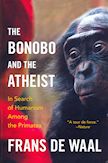Some extremist religious people claim it is impossible to be “good without God”: we are all steeped in original sin, and fear of God’s wrath is the only thing stopping people from murdering each other. Frankly, I don’t know whether to assume they don’t really believe this, or whether to avoid them in case they suffer a crisis of faith and go on a rampage.
de Waal demonstrates a rather more sensible source of our morality: it evolved. To bolster his argument, he provides many examples from the behaviours of chimps and bonobos. These apes have different kinds of social structures, one rather more violent than the other, but both exhibit what can easily be interpreted as moral behaviours, including a desire for fairness, respect for each others’ possessions, and altruism.
de Waal’s observations build up a strong picture of a proto-moral society, with the chimps and bonobos exhibiting a wide range of bottom up moral behaviours, and resorting to some top-down “policing” on the relatively few occasions when individual behaviour is wanting. The multiple descriptions draw a picture of a complex society of caring individual apes, plus the odd grouch.
In summary, we are moral because we evolved as social apes, and the kind of morality we have evolved lets us live together in relative harmony. We too need policing, but only for the outliers, not for everyday behaviours. So no need to worry about atheistic murderous rampages. Or no more than religious ones, anyway.


